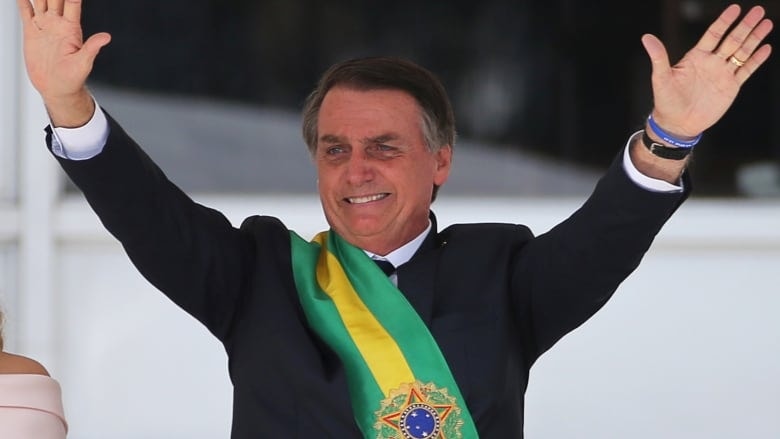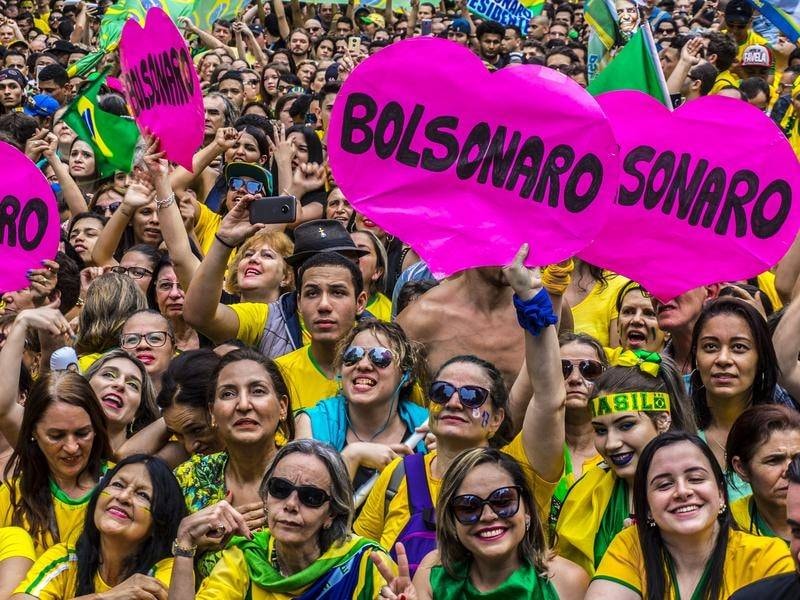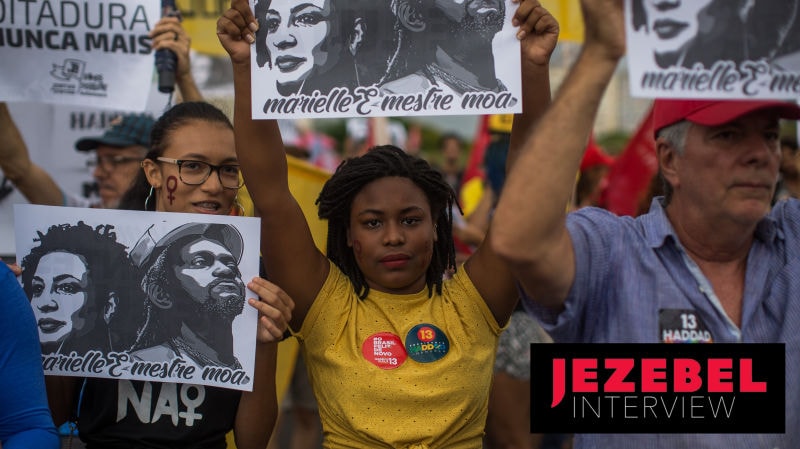“Tropical Donald Trump”: Different and Unpredictable
(Baonghean.vn) - Jair Bolsonaro, dubbed the “Tropical Donald Trump,” has officially been sworn in as President of Brazil for a four-year term. He is described as a hard-line populist leader and a supporter of Brazil’s previous military dictatorship.
 |
| New Brazilian President Jair Bolsonaro during his inauguration ceremony in the capital Brasilia on January 1, 2019. Photo: Reuters. |
Dream of joining the army
Sipping a beer over lunch in Eldorado, a sleepy town in Sao Paulo state, João Carmo da Silva, a friend of Brazil’s new President Jair Bolsonaro, recalled an incident nearly 50 years ago.
In 1970, Carlos Lamarca, a prominent leftist guerrilla leader of the resistance to the then-dictatorship in Brazil, shot at police at a gas station while fleeing a military manhunt. The subsequent military government hunt for the guerrillas was fierce, leaving several people injured.
Mr. Da Silva and his friend Bolsonaro, then 15, were the boys who witnessed the fight. But instead of hiding and watching the shooting, Mr. Silva said, Bolsonaro ran to report the incident to his school. Then, soldiers from the army stormed the village to clear out the leftists. That image inspired Bolsonaro to dream of joining the ranks of the soldiers. And from then on, Bolsonaro harbored hatred for the left.
According to Bolsonaro's friends, he was adamant that he would leave Eldorado to join the army. At that time, Brazilian presidents were all military men, while Bolsonaro also seemed to have dreams of becoming president.
In the end, the student from the small town of Eldorado achieved both of his goals: In 1977 he graduated from the Agulhas Negras Military Academy, serving in the artillery and amphibious forces; and finally winning the Brazilian presidency in 2018.
Tough and shock-inducing
During his 2018 election campaign, Jair Bolsonaro used the slogan “Brazil First, God First,” which immediately reminded the public of the political views of US leader Donald Trump with “America First.” Since then, the name Bolsonaro has received special attention from the international media and scholars. Although he does not come from a billionaire background like Donald Trump, the Brazilian politician has a style and views that are considered a “copy” of the 45th president of the United States. Bolsonaro himself also admitted that he admires the US leader.
 |
| Supporters of President Jair Bolsonaro during his 2018 election campaign. Photo: AP |
Mr. Bolsonaro has always considered himself a political outsider, although he began his political career in 1988 when he was elected to the Rio de Janeiro City Council. In 1990, he became a member of the Brazilian Congress. In 2014, he was the most-voted congressman in Rio de Janeiro.
During his three decades in politics, Mr. Bolsonaro has built himself an image of an “outsider” willing to confront a political class that is widely seen as involved in systemic corruption. He has also built an image of a tough, uncompromising and decisive politician, especially pursuing far-right and populist political views.
Tough commitments and “shocking” statements helped Mr. Bolsonaro become a breakthrough candidate in the 2018 election. Like the US leader, Mr. Bolsonaro loves social media and uses it as a tool to convey his political message.
His strategy is to “strike directly” on the most pressing issues in Brazilian society, including corruption, violent crime and economic recession. From the moment he decided to run for office, Mr. Bolsonaro expressed a different perspective from the traditional parties, from defending traditional family values, pledging an “iron fist” to deal with corruption and the growing organized crime situation, to improving the gloomy economic picture in recent years in this South American country. It was these strong commitments that led to Mr. Bolsonaro’s victory in the election in October 2018.
Considered a "new wind" in Brazilian politics, many of Mr. Bolsonaro's political views are controversial and receive a lot of criticism, such as his "offensive" statements about women, immigrants, his support for freedom of gun ownership, and especially his opposition to the gay community... In an interview with Playboy magazine in 2011, he once said that he would rather have his son die in an accident than be gay. He also called immigrants the "scum" of the earth. In 2016, Bolsonaro praised a man who had tortured many people during the military dictatorship (1964-1985), sparking a wave of criticism both in parliament and in society.
Make a difference
Bolsonaro's victory has shaken up Brazilian politics — and the polarizing figure's rise could set the Latin American country on a new, unpredictable path.
 |
| Many women's and human rights activists are even concerned that new President Bolsonaro will destroy Brazil's democratic values... Photo: Getty |
Jair Bolsonaro’s goal after being elected was to “pacify” the country. Therefore, in his inaugural speech, he reiterated his commitment to uphold democratic principles, fight corruption and crime, and improve the economy.
He also presented a long list of ambitious reforms for Brazil, such as streamlining the government apparatus, from 29 ministries to 15 ministries, the intention to liberalize the economy, privatize all state-owned enterprises, including the giant oil corporation Petrobras; implementing new policies to prevent unemployment, create more jobs for workers, restart attracting foreign investment capital...
In foreign affairs, the new president has publicly stated his policy leaning towards the US and Israel. Mr. Bolsonaro has expressed his desire to move closer to Europe and Japan.
Many Brazilian voters support and are enthusiastic about the decisions of new leader Bolsonaro, but there are also many concerns. For example, the new President's tough stance on fighting crime has led many to believe that it could lead to unpredictable consequences.
Bolsonaro recently issued a decree to loosen gun laws so that “good” citizens can own firearms when dealing with armed criminals, an issue that 61% of Brazilians oppose. His pledge to extend immunity to security forces for using lethal force while suppressing suspects has also caused confusion. He once declared, “A police officer who does not kill is not a police officer.”
As a staunch opponent of homosexuality, although Brazil legalized same-sex marriage in 2013, with the new policies, the LGBT community in this country will likely face unpredictable challenges. Many social activists for women and human rights are even concerned that the new President Bolsonaro will destroy Brazil's democratic values... In particular, many people are concerned that the new President, who comes from the military and has praised dictators, could revive the policies of the old regime.

